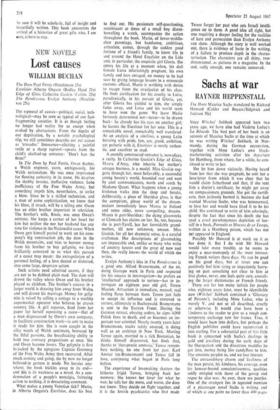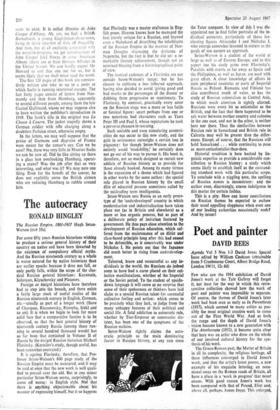Sachs at war
RAYNER HEPPENSTALL
The Hunt Maurice Sachs translated by Richard Howard (Calder and Boyars/Sidgwick and Jackson 30s) Since Witches' Sabbath appeared here two years ago, we have also had Violette Leduc's La Batarde. The best part of her book is an account of Maurice Sachs at the time at which he was writing Witches' Sabbath, in Nor- mandy, during the German occupation, together with Mme Leduc's own black- marketeering activities after his departure for Hamburg, from where, for a while, he con- tinued to write to her.
She let him down viciously. Having heard from her that she was pregnant, he sent her a love-letter from which it was clear that he would claim fatherhood and that, if she sent him a doctor's certificate, he might get away on compassionate grounds. She got the certifi- cate, then jealously burned it, because she had wanted Maurice Sachs, who was homosexual, to love her and would have liked it to be his child. She continued to write of him adoringly, despite the fact that since his death she has cead a cruel pseudonymous depiction of her- self in a book, Portraits et Moeurs de ce Temps, written in a Hamburg prison, which has not IV appeared in England.
Possibly Mr Howard is at work on it or has done it. But I do wish Mr Howard would take more trouble, as he seems to enjoy a near-monopoly of the most interest- ing French writers these days. He can be good on his good days, but at times one can positively feel him tiring or impatiently hurry- ing on past something not clear to him at first glance, never, one feels quite sure, consult- ing the larger dictionaries or French friends.
There are far too many initials for people who, eighteen years later, must be identifiable now (Witches' Sabbath contained a 'Glossary Of Persons), including Mme Leduc, who is merely V. and not at all described, cruelly or otherwise. It would also have been a kindness to the reader to give us a rough con- temporary exchange rate for francs. True, it would have been into dollars, but perhaps the English publisher could have reconverted it into sterling. For a substantial part of this little book is concerned with Sachs's dealings in gold and jewellery during the early days of the Occupation and the disastrous muddles he got into, money being like candyfloss to him. The amounts perplex us, and we lose interest.
The extraordinary charm and liveliness of the man persist, his kindness, his courage, even his honour-bound conscientiousness, qualities oddly mingled with those of the gossip and rogue he also was. As ever, there are puzzles. One of the strangest lies in repeated mention of a picaresque novel Sachs is writing and of which -at one point no fewer than 400 pages seem to exist. It is called Histoire de John Cooper d'Albany. Ah, yes, we feel. a Britilh Barnabooth, a young Englishman-about-town, living in those smartest of flats off Piccadilly. And then, not at all explicitly connected with the novel-in-progress, we get reminiscelces of John Cooper [sic] Powys in some American Albany (there are at least thirteen Albanys in the United States). We can hardly expect Mr Howard to sort that one out for us, but it seems likely that we shall never read the novel.
The first 120 pages of this book are consecu- tively written and take us up to a point at which Sachs is running interzonal escapes. The last forty pages consist of letters from Nor- mandy and then from Hamburg, apparently to several different people, among them the late Gaston- Gallimard, whom we may suppose also to have written the publisher's introduction in 1949. The book's title in the original was La Chasse a Courre. The jacket stupidly shows a German soldier with rifle charging along a doubtless Parisian street, otherwise empty.
In the letters, we may well suppose that the praise of Germans and dispraise of France were meant for the censor's eye. Can we be sure? No, there was very little in Maurice Sachs we can be sure of. Did he like sitting up there in a glass box overlooking Hamburg, operat- ing a crane? Was the job after that so very interesting, and what was it? We may note one thing. Even for the benefit of the censor, he does not explicitly curse the British airmen who are reducing Hamburg to rubble around him.































 Previous page
Previous page